Business Environment Report: Primark's Strategies and Challenges
VerifiedAdded on 2020/01/07
|12
|3749
|204
Report
AI Summary
This report provides a comprehensive analysis of Primark's business environment. It begins with an introduction to the business environment and Primark's structure, purposes, and objectives, including stakeholder satisfaction strategies. The report then explores the economic systems of the UK, Cuba, and China, and assesses the impact of fiscal and monetary policies on businesses. Further, the report evaluates the influence of market structures on pricing and output decisions and examines how market forces shape organizational responses. It also discusses the impact of business and cultural environments on Primark. Finally, the report investigates the significance of international trade to UK businesses, the impact of global factors, and the policies of the European Union on UK organizations. The report concludes with a summary of the key findings and references cited within the analysis.
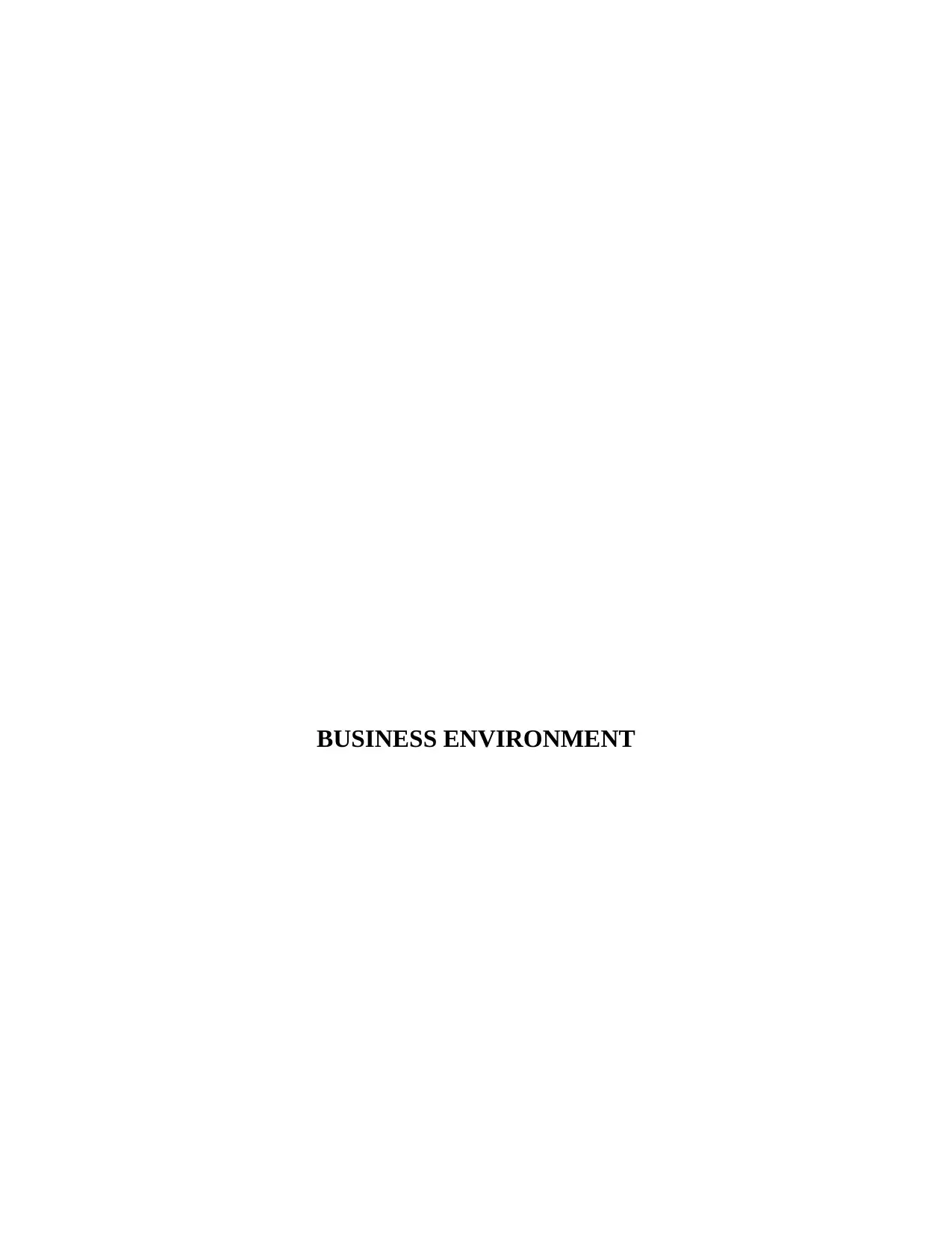
BUSINESS ENVIRONMENT
Paraphrase This Document
Need a fresh take? Get an instant paraphrase of this document with our AI Paraphraser
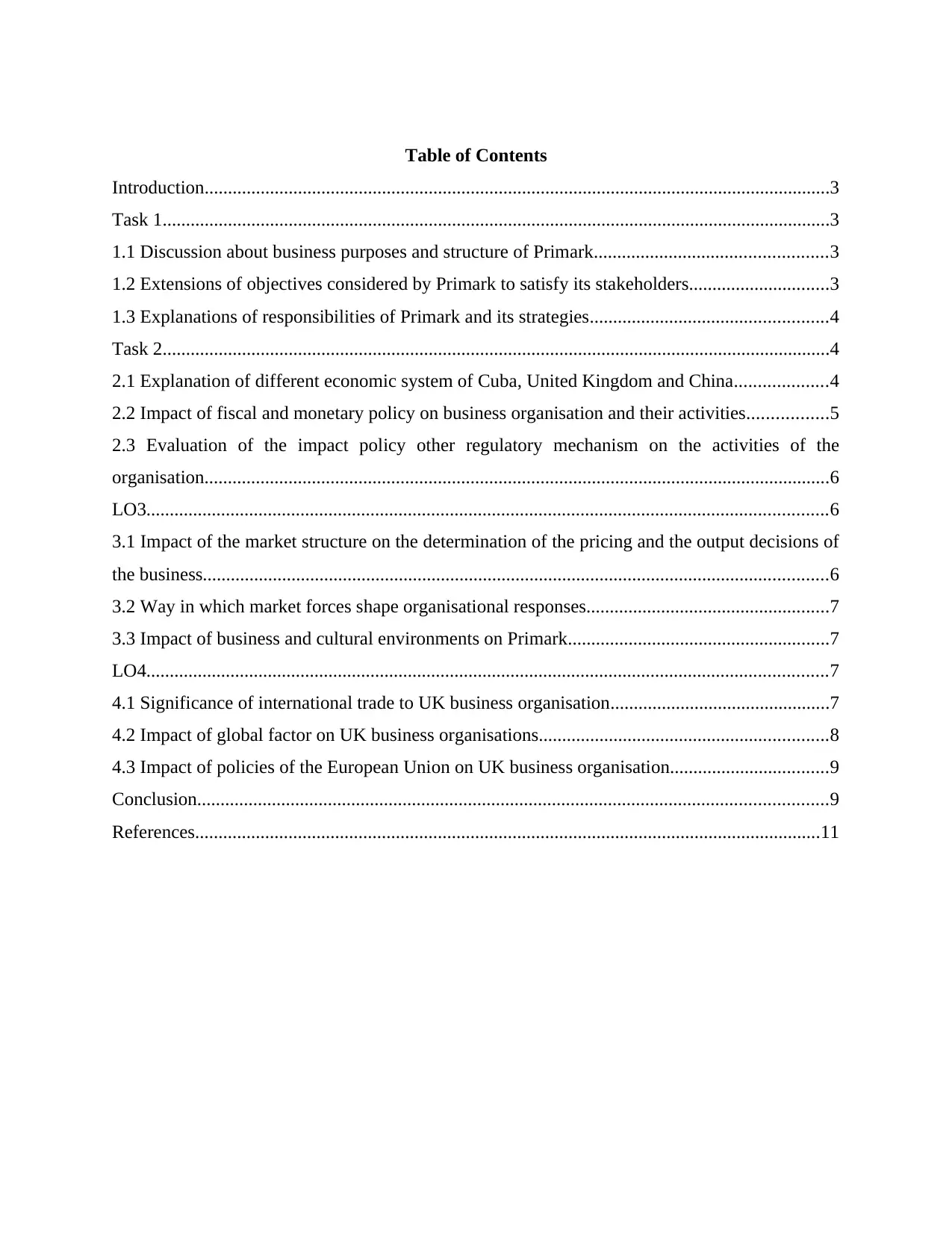
Table of Contents
Introduction......................................................................................................................................3
Task 1...............................................................................................................................................3
1.1 Discussion about business purposes and structure of Primark..................................................3
1.2 Extensions of objectives considered by Primark to satisfy its stakeholders..............................3
1.3 Explanations of responsibilities of Primark and its strategies...................................................4
Task 2...............................................................................................................................................4
2.1 Explanation of different economic system of Cuba, United Kingdom and China....................4
2.2 Impact of fiscal and monetary policy on business organisation and their activities.................5
2.3 Evaluation of the impact policy other regulatory mechanism on the activities of the
organisation......................................................................................................................................6
LO3..................................................................................................................................................6
3.1 Impact of the market structure on the determination of the pricing and the output decisions of
the business......................................................................................................................................6
3.2 Way in which market forces shape organisational responses....................................................7
3.3 Impact of business and cultural environments on Primark........................................................7
LO4..................................................................................................................................................7
4.1 Significance of international trade to UK business organisation...............................................7
4.2 Impact of global factor on UK business organisations..............................................................8
4.3 Impact of policies of the European Union on UK business organisation..................................9
Conclusion.......................................................................................................................................9
References......................................................................................................................................11
Introduction......................................................................................................................................3
Task 1...............................................................................................................................................3
1.1 Discussion about business purposes and structure of Primark..................................................3
1.2 Extensions of objectives considered by Primark to satisfy its stakeholders..............................3
1.3 Explanations of responsibilities of Primark and its strategies...................................................4
Task 2...............................................................................................................................................4
2.1 Explanation of different economic system of Cuba, United Kingdom and China....................4
2.2 Impact of fiscal and monetary policy on business organisation and their activities.................5
2.3 Evaluation of the impact policy other regulatory mechanism on the activities of the
organisation......................................................................................................................................6
LO3..................................................................................................................................................6
3.1 Impact of the market structure on the determination of the pricing and the output decisions of
the business......................................................................................................................................6
3.2 Way in which market forces shape organisational responses....................................................7
3.3 Impact of business and cultural environments on Primark........................................................7
LO4..................................................................................................................................................7
4.1 Significance of international trade to UK business organisation...............................................7
4.2 Impact of global factor on UK business organisations..............................................................8
4.3 Impact of policies of the European Union on UK business organisation..................................9
Conclusion.......................................................................................................................................9
References......................................................................................................................................11
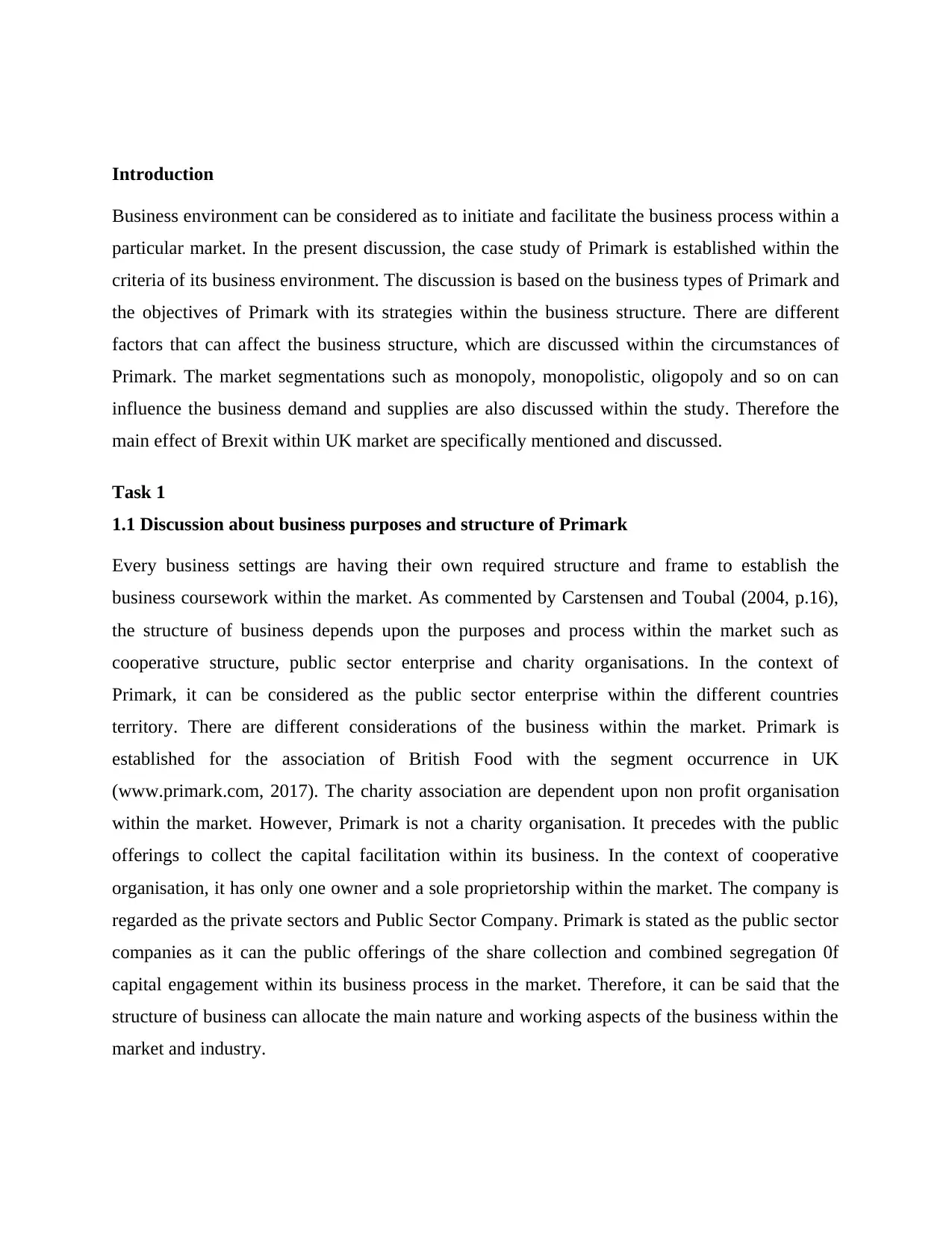
Introduction
Business environment can be considered as to initiate and facilitate the business process within a
particular market. In the present discussion, the case study of Primark is established within the
criteria of its business environment. The discussion is based on the business types of Primark and
the objectives of Primark with its strategies within the business structure. There are different
factors that can affect the business structure, which are discussed within the circumstances of
Primark. The market segmentations such as monopoly, monopolistic, oligopoly and so on can
influence the business demand and supplies are also discussed within the study. Therefore the
main effect of Brexit within UK market are specifically mentioned and discussed.
Task 1
1.1 Discussion about business purposes and structure of Primark
Every business settings are having their own required structure and frame to establish the
business coursework within the market. As commented by Carstensen and Toubal (2004, p.16),
the structure of business depends upon the purposes and process within the market such as
cooperative structure, public sector enterprise and charity organisations. In the context of
Primark, it can be considered as the public sector enterprise within the different countries
territory. There are different considerations of the business within the market. Primark is
established for the association of British Food with the segment occurrence in UK
(www.primark.com, 2017). The charity association are dependent upon non profit organisation
within the market. However, Primark is not a charity organisation. It precedes with the public
offerings to collect the capital facilitation within its business. In the context of cooperative
organisation, it has only one owner and a sole proprietorship within the market. The company is
regarded as the private sectors and Public Sector Company. Primark is stated as the public sector
companies as it can the public offerings of the share collection and combined segregation 0f
capital engagement within its business process in the market. Therefore, it can be said that the
structure of business can allocate the main nature and working aspects of the business within the
market and industry.
Business environment can be considered as to initiate and facilitate the business process within a
particular market. In the present discussion, the case study of Primark is established within the
criteria of its business environment. The discussion is based on the business types of Primark and
the objectives of Primark with its strategies within the business structure. There are different
factors that can affect the business structure, which are discussed within the circumstances of
Primark. The market segmentations such as monopoly, monopolistic, oligopoly and so on can
influence the business demand and supplies are also discussed within the study. Therefore the
main effect of Brexit within UK market are specifically mentioned and discussed.
Task 1
1.1 Discussion about business purposes and structure of Primark
Every business settings are having their own required structure and frame to establish the
business coursework within the market. As commented by Carstensen and Toubal (2004, p.16),
the structure of business depends upon the purposes and process within the market such as
cooperative structure, public sector enterprise and charity organisations. In the context of
Primark, it can be considered as the public sector enterprise within the different countries
territory. There are different considerations of the business within the market. Primark is
established for the association of British Food with the segment occurrence in UK
(www.primark.com, 2017). The charity association are dependent upon non profit organisation
within the market. However, Primark is not a charity organisation. It precedes with the public
offerings to collect the capital facilitation within its business. In the context of cooperative
organisation, it has only one owner and a sole proprietorship within the market. The company is
regarded as the private sectors and Public Sector Company. Primark is stated as the public sector
companies as it can the public offerings of the share collection and combined segregation 0f
capital engagement within its business process in the market. Therefore, it can be said that the
structure of business can allocate the main nature and working aspects of the business within the
market and industry.
⊘ This is a preview!⊘
Do you want full access?
Subscribe today to unlock all pages.

Trusted by 1+ million students worldwide
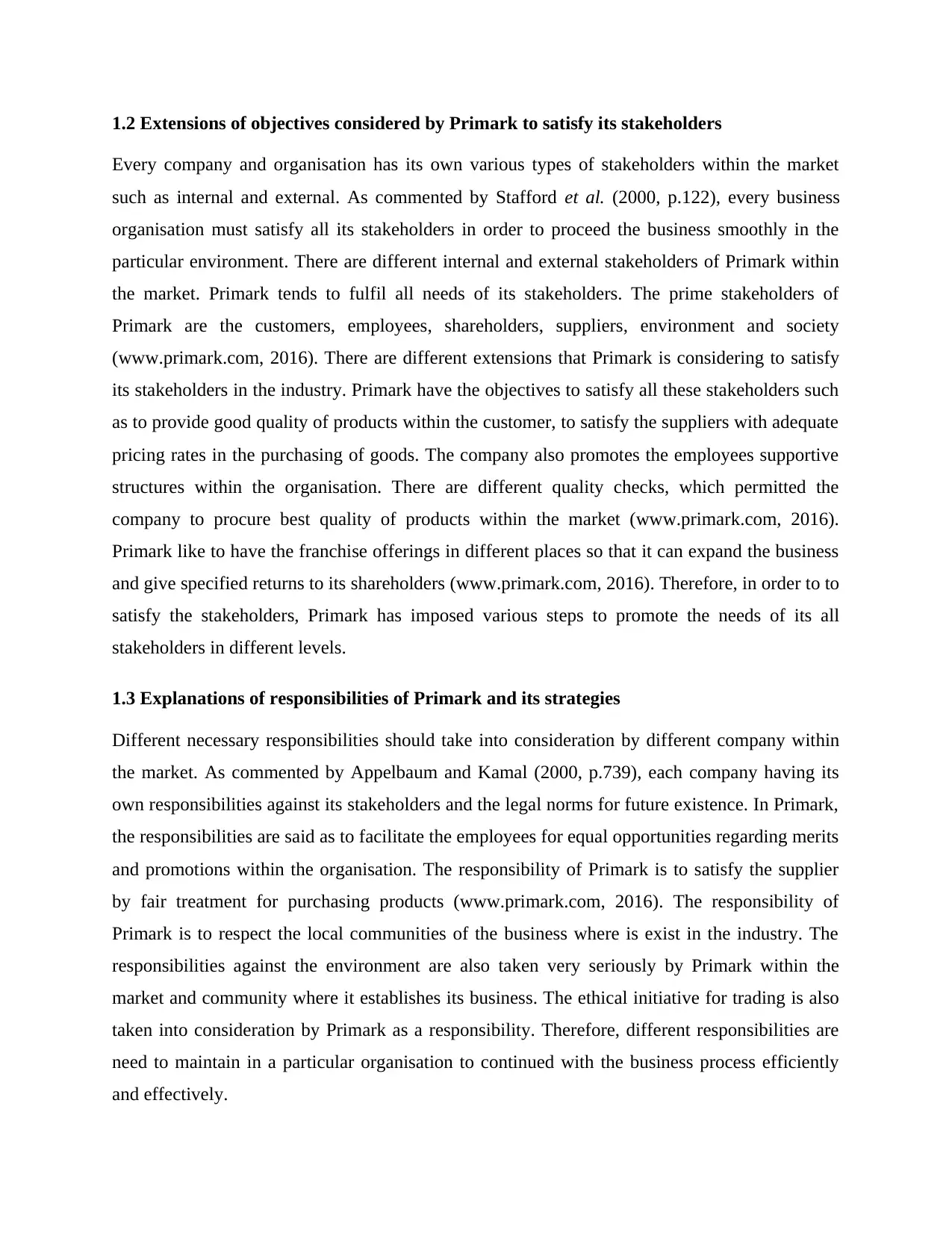
1.2 Extensions of objectives considered by Primark to satisfy its stakeholders
Every company and organisation has its own various types of stakeholders within the market
such as internal and external. As commented by Stafford et al. (2000, p.122), every business
organisation must satisfy all its stakeholders in order to proceed the business smoothly in the
particular environment. There are different internal and external stakeholders of Primark within
the market. Primark tends to fulfil all needs of its stakeholders. The prime stakeholders of
Primark are the customers, employees, shareholders, suppliers, environment and society
(www.primark.com, 2016). There are different extensions that Primark is considering to satisfy
its stakeholders in the industry. Primark have the objectives to satisfy all these stakeholders such
as to provide good quality of products within the customer, to satisfy the suppliers with adequate
pricing rates in the purchasing of goods. The company also promotes the employees supportive
structures within the organisation. There are different quality checks, which permitted the
company to procure best quality of products within the market (www.primark.com, 2016).
Primark like to have the franchise offerings in different places so that it can expand the business
and give specified returns to its shareholders (www.primark.com, 2016). Therefore, in order to to
satisfy the stakeholders, Primark has imposed various steps to promote the needs of its all
stakeholders in different levels.
1.3 Explanations of responsibilities of Primark and its strategies
Different necessary responsibilities should take into consideration by different company within
the market. As commented by Appelbaum and Kamal (2000, p.739), each company having its
own responsibilities against its stakeholders and the legal norms for future existence. In Primark,
the responsibilities are said as to facilitate the employees for equal opportunities regarding merits
and promotions within the organisation. The responsibility of Primark is to satisfy the supplier
by fair treatment for purchasing products (www.primark.com, 2016). The responsibility of
Primark is to respect the local communities of the business where is exist in the industry. The
responsibilities against the environment are also taken very seriously by Primark within the
market and community where it establishes its business. The ethical initiative for trading is also
taken into consideration by Primark as a responsibility. Therefore, different responsibilities are
need to maintain in a particular organisation to continued with the business process efficiently
and effectively.
Every company and organisation has its own various types of stakeholders within the market
such as internal and external. As commented by Stafford et al. (2000, p.122), every business
organisation must satisfy all its stakeholders in order to proceed the business smoothly in the
particular environment. There are different internal and external stakeholders of Primark within
the market. Primark tends to fulfil all needs of its stakeholders. The prime stakeholders of
Primark are the customers, employees, shareholders, suppliers, environment and society
(www.primark.com, 2016). There are different extensions that Primark is considering to satisfy
its stakeholders in the industry. Primark have the objectives to satisfy all these stakeholders such
as to provide good quality of products within the customer, to satisfy the suppliers with adequate
pricing rates in the purchasing of goods. The company also promotes the employees supportive
structures within the organisation. There are different quality checks, which permitted the
company to procure best quality of products within the market (www.primark.com, 2016).
Primark like to have the franchise offerings in different places so that it can expand the business
and give specified returns to its shareholders (www.primark.com, 2016). Therefore, in order to to
satisfy the stakeholders, Primark has imposed various steps to promote the needs of its all
stakeholders in different levels.
1.3 Explanations of responsibilities of Primark and its strategies
Different necessary responsibilities should take into consideration by different company within
the market. As commented by Appelbaum and Kamal (2000, p.739), each company having its
own responsibilities against its stakeholders and the legal norms for future existence. In Primark,
the responsibilities are said as to facilitate the employees for equal opportunities regarding merits
and promotions within the organisation. The responsibility of Primark is to satisfy the supplier
by fair treatment for purchasing products (www.primark.com, 2016). The responsibility of
Primark is to respect the local communities of the business where is exist in the industry. The
responsibilities against the environment are also taken very seriously by Primark within the
market and community where it establishes its business. The ethical initiative for trading is also
taken into consideration by Primark as a responsibility. Therefore, different responsibilities are
need to maintain in a particular organisation to continued with the business process efficiently
and effectively.
Paraphrase This Document
Need a fresh take? Get an instant paraphrase of this document with our AI Paraphraser
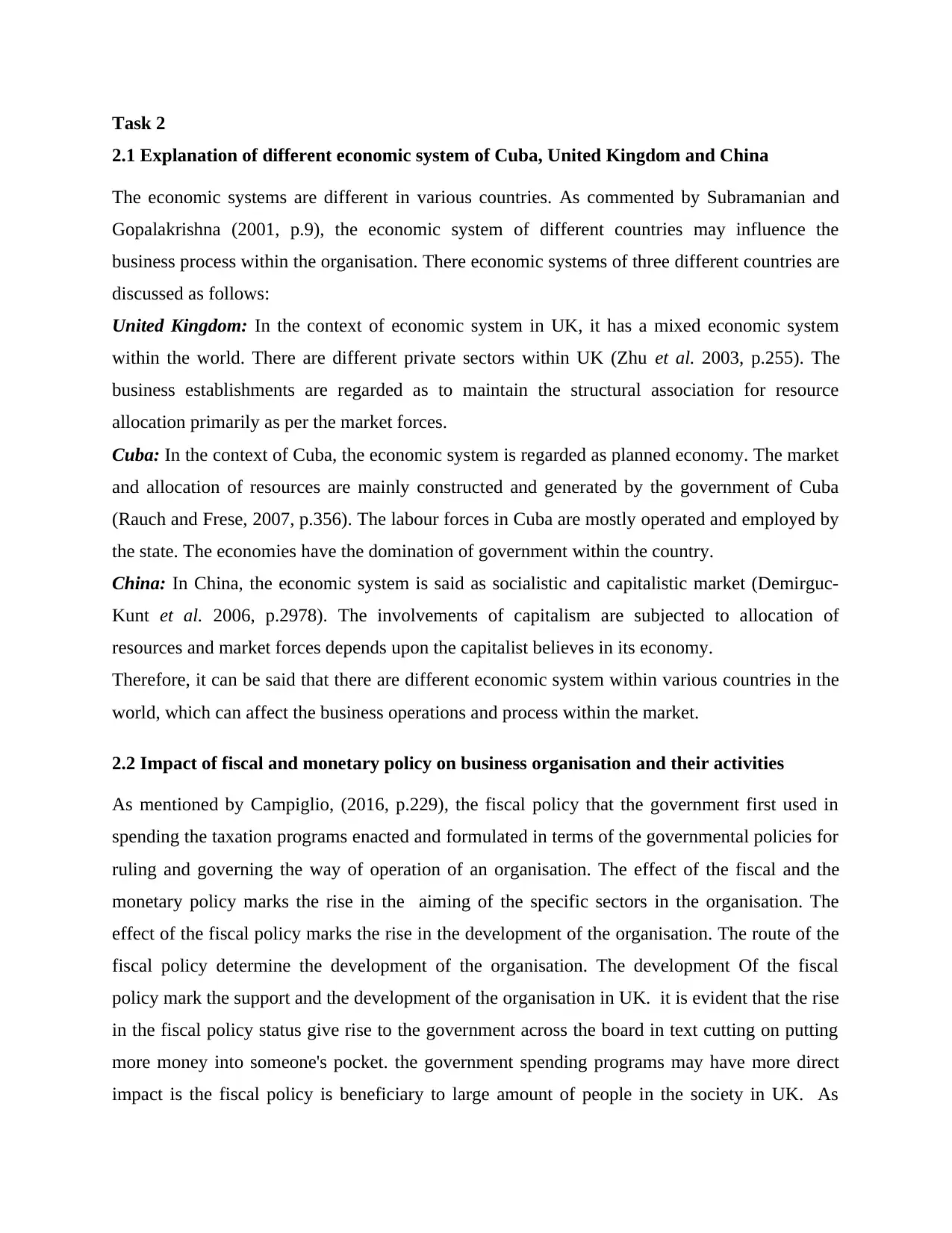
Task 2
2.1 Explanation of different economic system of Cuba, United Kingdom and China
The economic systems are different in various countries. As commented by Subramanian and
Gopalakrishna (2001, p.9), the economic system of different countries may influence the
business process within the organisation. There economic systems of three different countries are
discussed as follows:
United Kingdom: In the context of economic system in UK, it has a mixed economic system
within the world. There are different private sectors within UK (Zhu et al. 2003, p.255). The
business establishments are regarded as to maintain the structural association for resource
allocation primarily as per the market forces.
Cuba: In the context of Cuba, the economic system is regarded as planned economy. The market
and allocation of resources are mainly constructed and generated by the government of Cuba
(Rauch and Frese, 2007, p.356). The labour forces in Cuba are mostly operated and employed by
the state. The economies have the domination of government within the country.
China: In China, the economic system is said as socialistic and capitalistic market (Demirguc-
Kunt et al. 2006, p.2978). The involvements of capitalism are subjected to allocation of
resources and market forces depends upon the capitalist believes in its economy.
Therefore, it can be said that there are different economic system within various countries in the
world, which can affect the business operations and process within the market.
2.2 Impact of fiscal and monetary policy on business organisation and their activities
As mentioned by Campiglio, (2016, p.229), the fiscal policy that the government first used in
spending the taxation programs enacted and formulated in terms of the governmental policies for
ruling and governing the way of operation of an organisation. The effect of the fiscal and the
monetary policy marks the rise in the aiming of the specific sectors in the organisation. The
effect of the fiscal policy marks the rise in the development of the organisation. The route of the
fiscal policy determine the development of the organisation. The development Of the fiscal
policy mark the support and the development of the organisation in UK. it is evident that the rise
in the fiscal policy status give rise to the government across the board in text cutting on putting
more money into someone's pocket. the government spending programs may have more direct
impact is the fiscal policy is beneficiary to large amount of people in the society in UK. As
2.1 Explanation of different economic system of Cuba, United Kingdom and China
The economic systems are different in various countries. As commented by Subramanian and
Gopalakrishna (2001, p.9), the economic system of different countries may influence the
business process within the organisation. There economic systems of three different countries are
discussed as follows:
United Kingdom: In the context of economic system in UK, it has a mixed economic system
within the world. There are different private sectors within UK (Zhu et al. 2003, p.255). The
business establishments are regarded as to maintain the structural association for resource
allocation primarily as per the market forces.
Cuba: In the context of Cuba, the economic system is regarded as planned economy. The market
and allocation of resources are mainly constructed and generated by the government of Cuba
(Rauch and Frese, 2007, p.356). The labour forces in Cuba are mostly operated and employed by
the state. The economies have the domination of government within the country.
China: In China, the economic system is said as socialistic and capitalistic market (Demirguc-
Kunt et al. 2006, p.2978). The involvements of capitalism are subjected to allocation of
resources and market forces depends upon the capitalist believes in its economy.
Therefore, it can be said that there are different economic system within various countries in the
world, which can affect the business operations and process within the market.
2.2 Impact of fiscal and monetary policy on business organisation and their activities
As mentioned by Campiglio, (2016, p.229), the fiscal policy that the government first used in
spending the taxation programs enacted and formulated in terms of the governmental policies for
ruling and governing the way of operation of an organisation. The effect of the fiscal and the
monetary policy marks the rise in the aiming of the specific sectors in the organisation. The
effect of the fiscal policy marks the rise in the development of the organisation. The route of the
fiscal policy determine the development of the organisation. The development Of the fiscal
policy mark the support and the development of the organisation in UK. it is evident that the rise
in the fiscal policy status give rise to the government across the board in text cutting on putting
more money into someone's pocket. the government spending programs may have more direct
impact is the fiscal policy is beneficiary to large amount of people in the society in UK. As
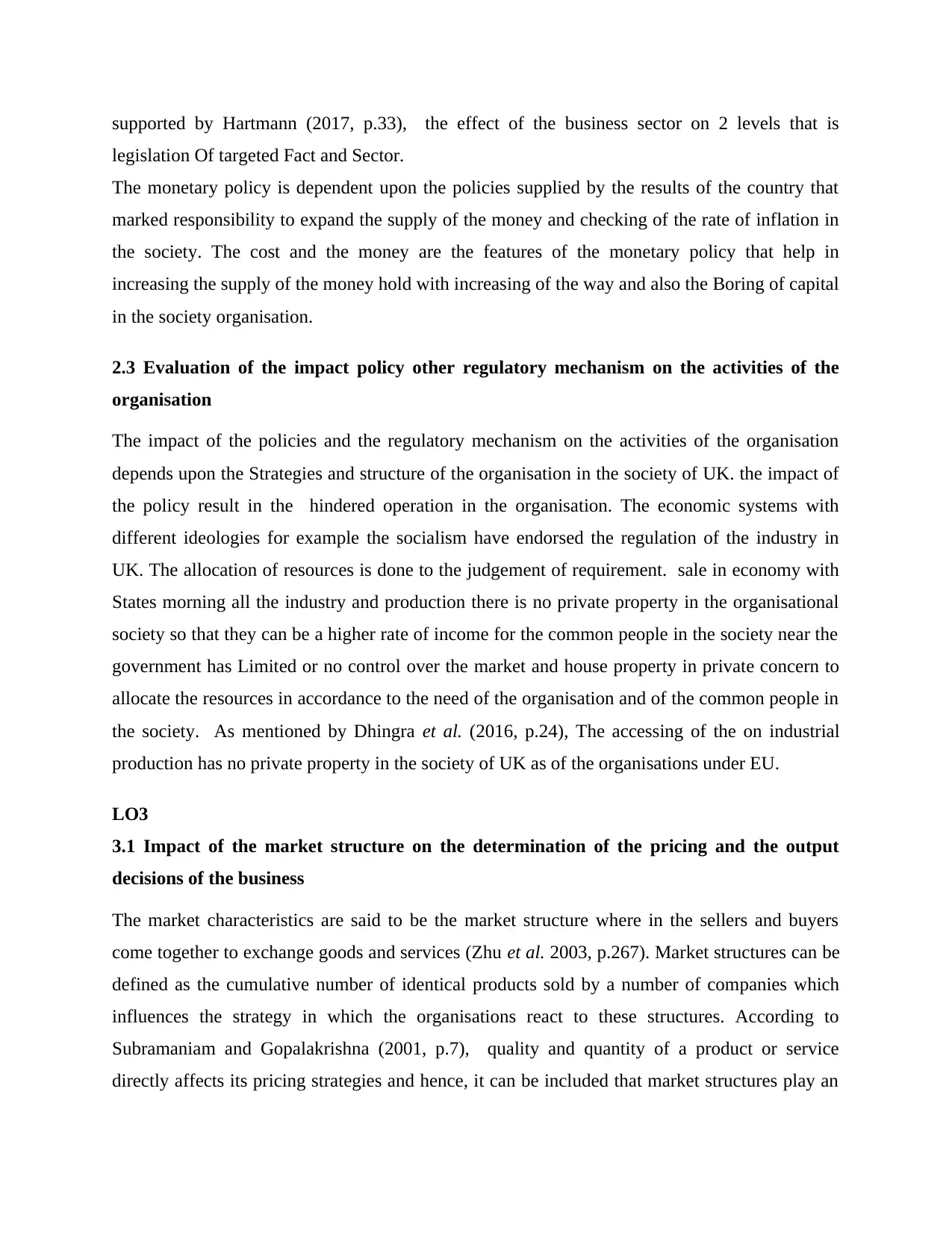
supported by Hartmann (2017, p.33), the effect of the business sector on 2 levels that is
legislation Of targeted Fact and Sector.
The monetary policy is dependent upon the policies supplied by the results of the country that
marked responsibility to expand the supply of the money and checking of the rate of inflation in
the society. The cost and the money are the features of the monetary policy that help in
increasing the supply of the money hold with increasing of the way and also the Boring of capital
in the society organisation.
2.3 Evaluation of the impact policy other regulatory mechanism on the activities of the
organisation
The impact of the policies and the regulatory mechanism on the activities of the organisation
depends upon the Strategies and structure of the organisation in the society of UK. the impact of
the policy result in the hindered operation in the organisation. The economic systems with
different ideologies for example the socialism have endorsed the regulation of the industry in
UK. The allocation of resources is done to the judgement of requirement. sale in economy with
States morning all the industry and production there is no private property in the organisational
society so that they can be a higher rate of income for the common people in the society near the
government has Limited or no control over the market and house property in private concern to
allocate the resources in accordance to the need of the organisation and of the common people in
the society. As mentioned by Dhingra et al. (2016, p.24), The accessing of the on industrial
production has no private property in the society of UK as of the organisations under EU.
LO3
3.1 Impact of the market structure on the determination of the pricing and the output
decisions of the business
The market characteristics are said to be the market structure where in the sellers and buyers
come together to exchange goods and services (Zhu et al. 2003, p.267). Market structures can be
defined as the cumulative number of identical products sold by a number of companies which
influences the strategy in which the organisations react to these structures. According to
Subramaniam and Gopalakrishna (2001, p.7), quality and quantity of a product or service
directly affects its pricing strategies and hence, it can be included that market structures play an
legislation Of targeted Fact and Sector.
The monetary policy is dependent upon the policies supplied by the results of the country that
marked responsibility to expand the supply of the money and checking of the rate of inflation in
the society. The cost and the money are the features of the monetary policy that help in
increasing the supply of the money hold with increasing of the way and also the Boring of capital
in the society organisation.
2.3 Evaluation of the impact policy other regulatory mechanism on the activities of the
organisation
The impact of the policies and the regulatory mechanism on the activities of the organisation
depends upon the Strategies and structure of the organisation in the society of UK. the impact of
the policy result in the hindered operation in the organisation. The economic systems with
different ideologies for example the socialism have endorsed the regulation of the industry in
UK. The allocation of resources is done to the judgement of requirement. sale in economy with
States morning all the industry and production there is no private property in the organisational
society so that they can be a higher rate of income for the common people in the society near the
government has Limited or no control over the market and house property in private concern to
allocate the resources in accordance to the need of the organisation and of the common people in
the society. As mentioned by Dhingra et al. (2016, p.24), The accessing of the on industrial
production has no private property in the society of UK as of the organisations under EU.
LO3
3.1 Impact of the market structure on the determination of the pricing and the output
decisions of the business
The market characteristics are said to be the market structure where in the sellers and buyers
come together to exchange goods and services (Zhu et al. 2003, p.267). Market structures can be
defined as the cumulative number of identical products sold by a number of companies which
influences the strategy in which the organisations react to these structures. According to
Subramaniam and Gopalakrishna (2001, p.7), quality and quantity of a product or service
directly affects its pricing strategies and hence, it can be included that market structures play an
⊘ This is a preview!⊘
Do you want full access?
Subscribe today to unlock all pages.

Trusted by 1+ million students worldwide
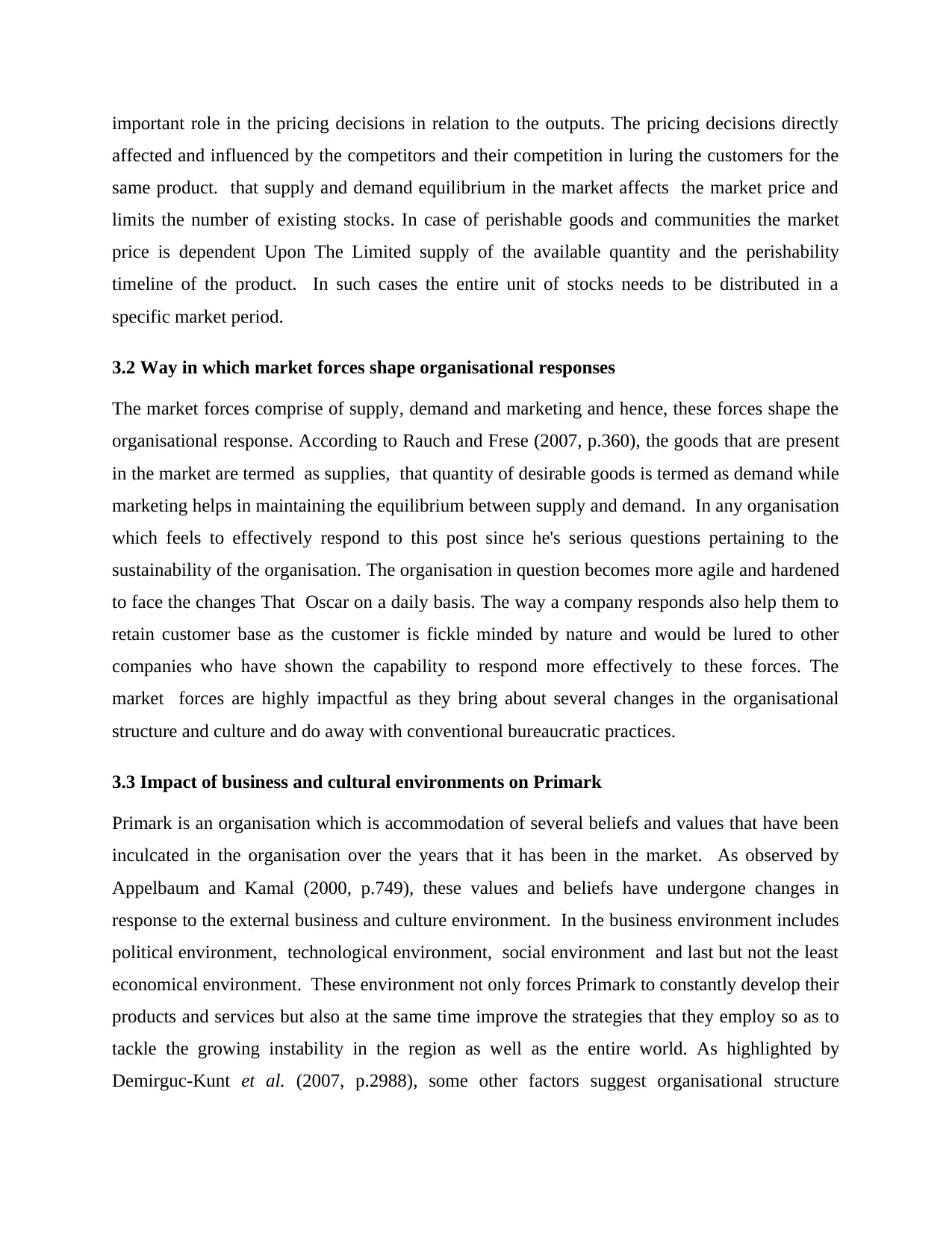
important role in the pricing decisions in relation to the outputs. The pricing decisions directly
affected and influenced by the competitors and their competition in luring the customers for the
same product. that supply and demand equilibrium in the market affects the market price and
limits the number of existing stocks. In case of perishable goods and communities the market
price is dependent Upon The Limited supply of the available quantity and the perishability
timeline of the product. In such cases the entire unit of stocks needs to be distributed in a
specific market period.
3.2 Way in which market forces shape organisational responses
The market forces comprise of supply, demand and marketing and hence, these forces shape the
organisational response. According to Rauch and Frese (2007, p.360), the goods that are present
in the market are termed as supplies, that quantity of desirable goods is termed as demand while
marketing helps in maintaining the equilibrium between supply and demand. In any organisation
which feels to effectively respond to this post since he's serious questions pertaining to the
sustainability of the organisation. The organisation in question becomes more agile and hardened
to face the changes That Oscar on a daily basis. The way a company responds also help them to
retain customer base as the customer is fickle minded by nature and would be lured to other
companies who have shown the capability to respond more effectively to these forces. The
market forces are highly impactful as they bring about several changes in the organisational
structure and culture and do away with conventional bureaucratic practices.
3.3 Impact of business and cultural environments on Primark
Primark is an organisation which is accommodation of several beliefs and values that have been
inculcated in the organisation over the years that it has been in the market. As observed by
Appelbaum and Kamal (2000, p.749), these values and beliefs have undergone changes in
response to the external business and culture environment. In the business environment includes
political environment, technological environment, social environment and last but not the least
economical environment. These environment not only forces Primark to constantly develop their
products and services but also at the same time improve the strategies that they employ so as to
tackle the growing instability in the region as well as the entire world. As highlighted by
Demirguc-Kunt et al. (2007, p.2988), some other factors suggest organisational structure
affected and influenced by the competitors and their competition in luring the customers for the
same product. that supply and demand equilibrium in the market affects the market price and
limits the number of existing stocks. In case of perishable goods and communities the market
price is dependent Upon The Limited supply of the available quantity and the perishability
timeline of the product. In such cases the entire unit of stocks needs to be distributed in a
specific market period.
3.2 Way in which market forces shape organisational responses
The market forces comprise of supply, demand and marketing and hence, these forces shape the
organisational response. According to Rauch and Frese (2007, p.360), the goods that are present
in the market are termed as supplies, that quantity of desirable goods is termed as demand while
marketing helps in maintaining the equilibrium between supply and demand. In any organisation
which feels to effectively respond to this post since he's serious questions pertaining to the
sustainability of the organisation. The organisation in question becomes more agile and hardened
to face the changes That Oscar on a daily basis. The way a company responds also help them to
retain customer base as the customer is fickle minded by nature and would be lured to other
companies who have shown the capability to respond more effectively to these forces. The
market forces are highly impactful as they bring about several changes in the organisational
structure and culture and do away with conventional bureaucratic practices.
3.3 Impact of business and cultural environments on Primark
Primark is an organisation which is accommodation of several beliefs and values that have been
inculcated in the organisation over the years that it has been in the market. As observed by
Appelbaum and Kamal (2000, p.749), these values and beliefs have undergone changes in
response to the external business and culture environment. In the business environment includes
political environment, technological environment, social environment and last but not the least
economical environment. These environment not only forces Primark to constantly develop their
products and services but also at the same time improve the strategies that they employ so as to
tackle the growing instability in the region as well as the entire world. As highlighted by
Demirguc-Kunt et al. (2007, p.2988), some other factors suggest organisational structure
Paraphrase This Document
Need a fresh take? Get an instant paraphrase of this document with our AI Paraphraser
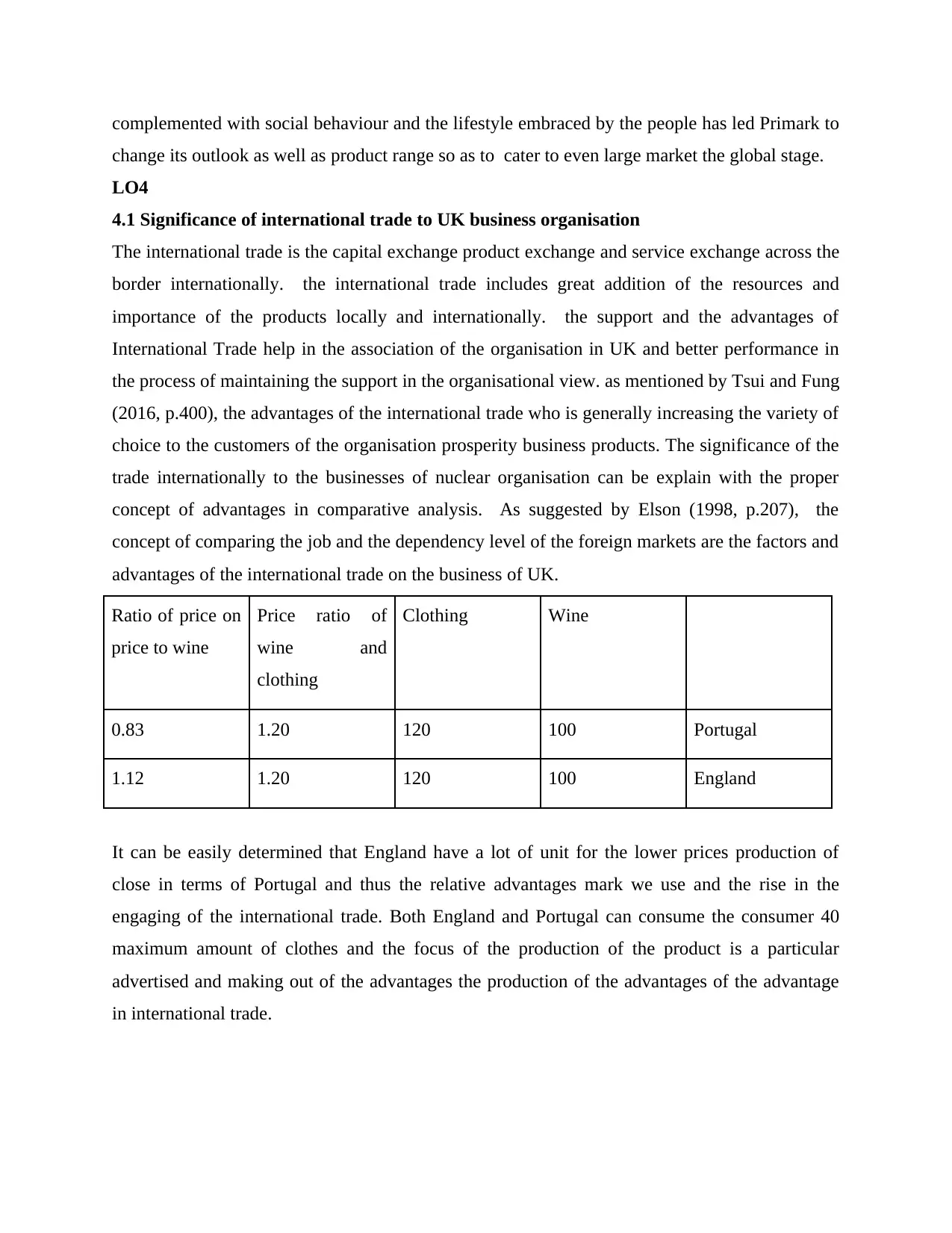
complemented with social behaviour and the lifestyle embraced by the people has led Primark to
change its outlook as well as product range so as to cater to even large market the global stage.
LO4
4.1 Significance of international trade to UK business organisation
The international trade is the capital exchange product exchange and service exchange across the
border internationally. the international trade includes great addition of the resources and
importance of the products locally and internationally. the support and the advantages of
International Trade help in the association of the organisation in UK and better performance in
the process of maintaining the support in the organisational view. as mentioned by Tsui and Fung
(2016, p.400), the advantages of the international trade who is generally increasing the variety of
choice to the customers of the organisation prosperity business products. The significance of the
trade internationally to the businesses of nuclear organisation can be explain with the proper
concept of advantages in comparative analysis. As suggested by Elson (1998, p.207), the
concept of comparing the job and the dependency level of the foreign markets are the factors and
advantages of the international trade on the business of UK.
WineClothingPrice ratio of
wine and
clothing
Ratio of price on
price to wine
Portugal1001201.200.83
England1001201.201.12
It can be easily determined that England have a lot of unit for the lower prices production of
close in terms of Portugal and thus the relative advantages mark we use and the rise in the
engaging of the international trade. Both England and Portugal can consume the consumer 40
maximum amount of clothes and the focus of the production of the product is a particular
advertised and making out of the advantages the production of the advantages of the advantage
in international trade.
change its outlook as well as product range so as to cater to even large market the global stage.
LO4
4.1 Significance of international trade to UK business organisation
The international trade is the capital exchange product exchange and service exchange across the
border internationally. the international trade includes great addition of the resources and
importance of the products locally and internationally. the support and the advantages of
International Trade help in the association of the organisation in UK and better performance in
the process of maintaining the support in the organisational view. as mentioned by Tsui and Fung
(2016, p.400), the advantages of the international trade who is generally increasing the variety of
choice to the customers of the organisation prosperity business products. The significance of the
trade internationally to the businesses of nuclear organisation can be explain with the proper
concept of advantages in comparative analysis. As suggested by Elson (1998, p.207), the
concept of comparing the job and the dependency level of the foreign markets are the factors and
advantages of the international trade on the business of UK.
WineClothingPrice ratio of
wine and
clothing
Ratio of price on
price to wine
Portugal1001201.200.83
England1001201.201.12
It can be easily determined that England have a lot of unit for the lower prices production of
close in terms of Portugal and thus the relative advantages mark we use and the rise in the
engaging of the international trade. Both England and Portugal can consume the consumer 40
maximum amount of clothes and the focus of the production of the product is a particular
advertised and making out of the advantages the production of the advantages of the advantage
in international trade.
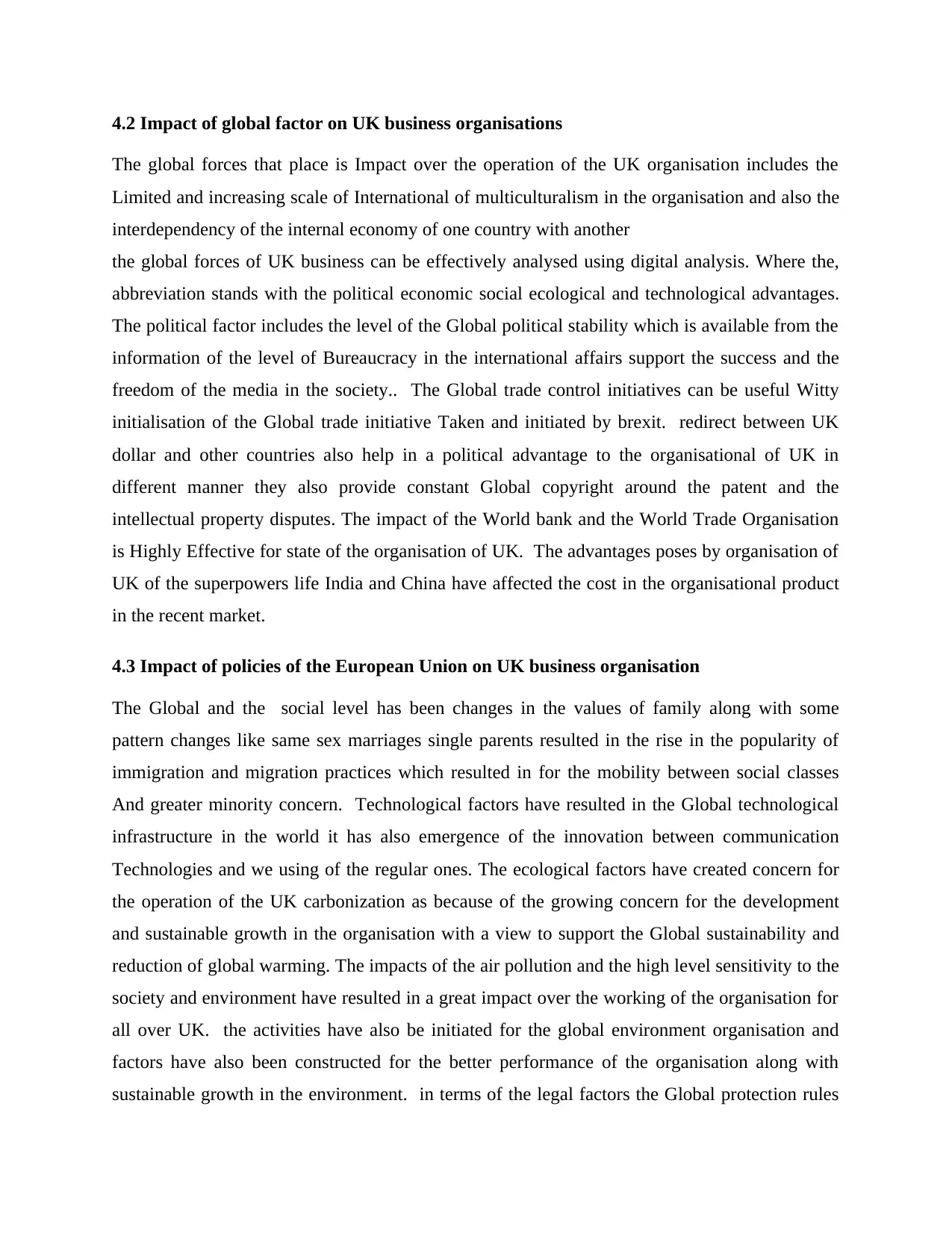
4.2 Impact of global factor on UK business organisations
The global forces that place is Impact over the operation of the UK organisation includes the
Limited and increasing scale of International of multiculturalism in the organisation and also the
interdependency of the internal economy of one country with another
the global forces of UK business can be effectively analysed using digital analysis. Where the,
abbreviation stands with the political economic social ecological and technological advantages.
The political factor includes the level of the Global political stability which is available from the
information of the level of Bureaucracy in the international affairs support the success and the
freedom of the media in the society.. The Global trade control initiatives can be useful Witty
initialisation of the Global trade initiative Taken and initiated by brexit. redirect between UK
dollar and other countries also help in a political advantage to the organisational of UK in
different manner they also provide constant Global copyright around the patent and the
intellectual property disputes. The impact of the World bank and the World Trade Organisation
is Highly Effective for state of the organisation of UK. The advantages poses by organisation of
UK of the superpowers life India and China have affected the cost in the organisational product
in the recent market.
4.3 Impact of policies of the European Union on UK business organisation
The Global and the social level has been changes in the values of family along with some
pattern changes like same sex marriages single parents resulted in the rise in the popularity of
immigration and migration practices which resulted in for the mobility between social classes
And greater minority concern. Technological factors have resulted in the Global technological
infrastructure in the world it has also emergence of the innovation between communication
Technologies and we using of the regular ones. The ecological factors have created concern for
the operation of the UK carbonization as because of the growing concern for the development
and sustainable growth in the organisation with a view to support the Global sustainability and
reduction of global warming. The impacts of the air pollution and the high level sensitivity to the
society and environment have resulted in a great impact over the working of the organisation for
all over UK. the activities have also be initiated for the global environment organisation and
factors have also been constructed for the better performance of the organisation along with
sustainable growth in the environment. in terms of the legal factors the Global protection rules
The global forces that place is Impact over the operation of the UK organisation includes the
Limited and increasing scale of International of multiculturalism in the organisation and also the
interdependency of the internal economy of one country with another
the global forces of UK business can be effectively analysed using digital analysis. Where the,
abbreviation stands with the political economic social ecological and technological advantages.
The political factor includes the level of the Global political stability which is available from the
information of the level of Bureaucracy in the international affairs support the success and the
freedom of the media in the society.. The Global trade control initiatives can be useful Witty
initialisation of the Global trade initiative Taken and initiated by brexit. redirect between UK
dollar and other countries also help in a political advantage to the organisational of UK in
different manner they also provide constant Global copyright around the patent and the
intellectual property disputes. The impact of the World bank and the World Trade Organisation
is Highly Effective for state of the organisation of UK. The advantages poses by organisation of
UK of the superpowers life India and China have affected the cost in the organisational product
in the recent market.
4.3 Impact of policies of the European Union on UK business organisation
The Global and the social level has been changes in the values of family along with some
pattern changes like same sex marriages single parents resulted in the rise in the popularity of
immigration and migration practices which resulted in for the mobility between social classes
And greater minority concern. Technological factors have resulted in the Global technological
infrastructure in the world it has also emergence of the innovation between communication
Technologies and we using of the regular ones. The ecological factors have created concern for
the operation of the UK carbonization as because of the growing concern for the development
and sustainable growth in the organisation with a view to support the Global sustainability and
reduction of global warming. The impacts of the air pollution and the high level sensitivity to the
society and environment have resulted in a great impact over the working of the organisation for
all over UK. the activities have also be initiated for the global environment organisation and
factors have also been constructed for the better performance of the organisation along with
sustainable growth in the environment. in terms of the legal factors the Global protection rules
⊘ This is a preview!⊘
Do you want full access?
Subscribe today to unlock all pages.

Trusted by 1+ million students worldwide
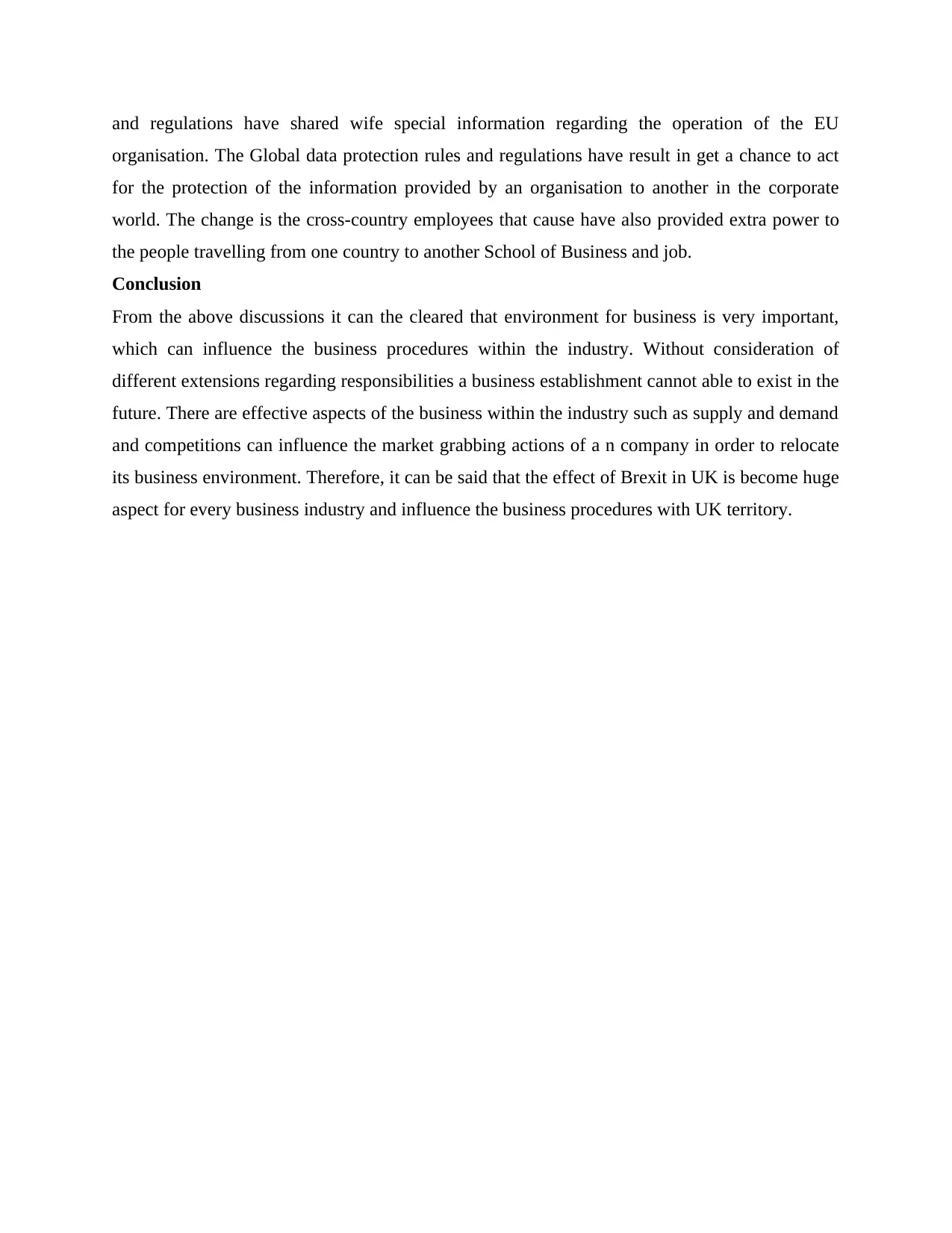
and regulations have shared wife special information regarding the operation of the EU
organisation. The Global data protection rules and regulations have result in get a chance to act
for the protection of the information provided by an organisation to another in the corporate
world. The change is the cross-country employees that cause have also provided extra power to
the people travelling from one country to another School of Business and job.
Conclusion
From the above discussions it can the cleared that environment for business is very important,
which can influence the business procedures within the industry. Without consideration of
different extensions regarding responsibilities a business establishment cannot able to exist in the
future. There are effective aspects of the business within the industry such as supply and demand
and competitions can influence the market grabbing actions of a n company in order to relocate
its business environment. Therefore, it can be said that the effect of Brexit in UK is become huge
aspect for every business industry and influence the business procedures with UK territory.
organisation. The Global data protection rules and regulations have result in get a chance to act
for the protection of the information provided by an organisation to another in the corporate
world. The change is the cross-country employees that cause have also provided extra power to
the people travelling from one country to another School of Business and job.
Conclusion
From the above discussions it can the cleared that environment for business is very important,
which can influence the business procedures within the industry. Without consideration of
different extensions regarding responsibilities a business establishment cannot able to exist in the
future. There are effective aspects of the business within the industry such as supply and demand
and competitions can influence the market grabbing actions of a n company in order to relocate
its business environment. Therefore, it can be said that the effect of Brexit in UK is become huge
aspect for every business industry and influence the business procedures with UK territory.
Paraphrase This Document
Need a fresh take? Get an instant paraphrase of this document with our AI Paraphraser
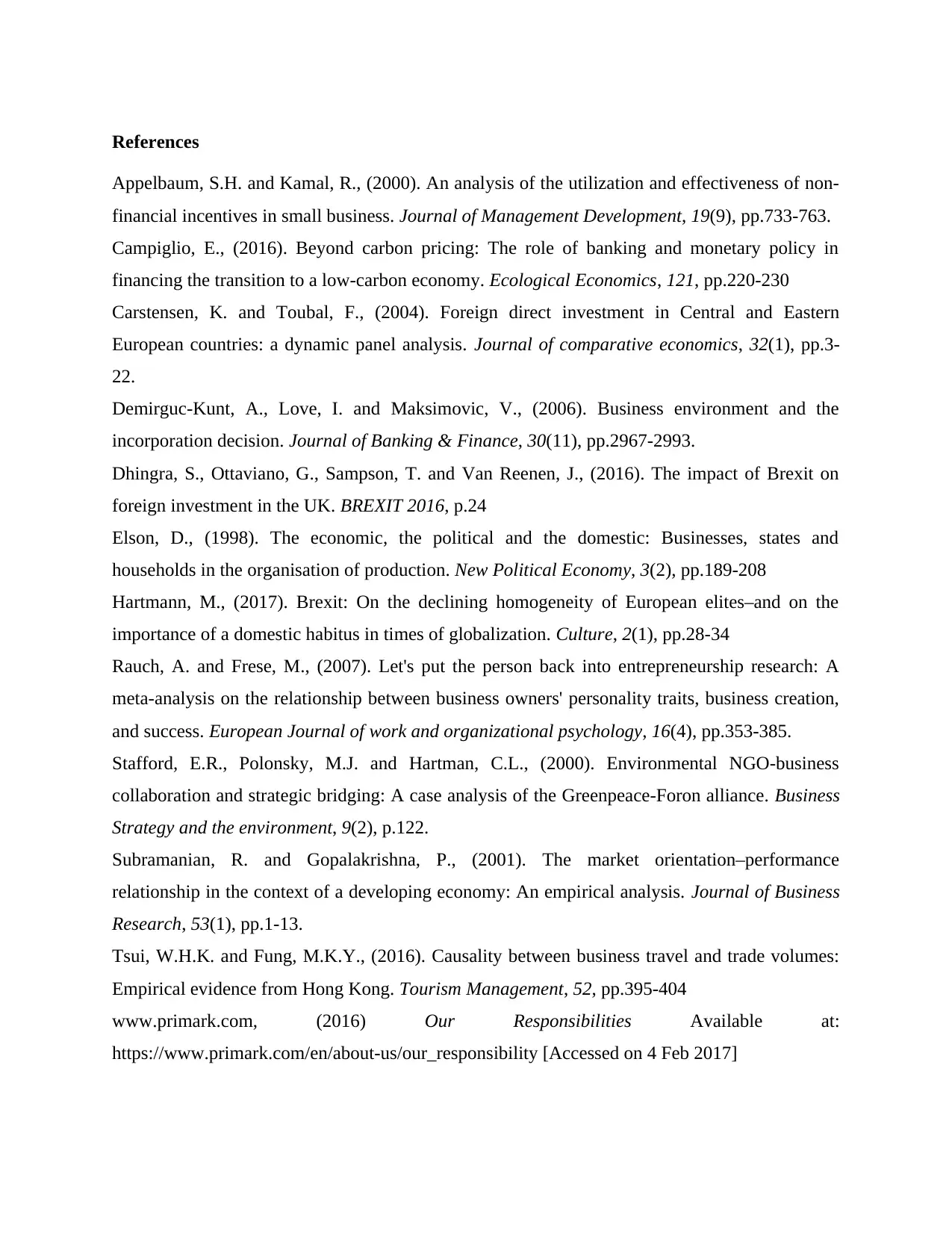
References
Appelbaum, S.H. and Kamal, R., (2000). An analysis of the utilization and effectiveness of non-
financial incentives in small business. Journal of Management Development, 19(9), pp.733-763.
Campiglio, E., (2016). Beyond carbon pricing: The role of banking and monetary policy in
financing the transition to a low-carbon economy. Ecological Economics, 121, pp.220-230
Carstensen, K. and Toubal, F., (2004). Foreign direct investment in Central and Eastern
European countries: a dynamic panel analysis. Journal of comparative economics, 32(1), pp.3-
22.
Demirguc-Kunt, A., Love, I. and Maksimovic, V., (2006). Business environment and the
incorporation decision. Journal of Banking & Finance, 30(11), pp.2967-2993.
Dhingra, S., Ottaviano, G., Sampson, T. and Van Reenen, J., (2016). The impact of Brexit on
foreign investment in the UK. BREXIT 2016, p.24
Elson, D., (1998). The economic, the political and the domestic: Businesses, states and
households in the organisation of production. New Political Economy, 3(2), pp.189-208
Hartmann, M., (2017). Brexit: On the declining homogeneity of European elites–and on the
importance of a domestic habitus in times of globalization. Culture, 2(1), pp.28-34
Rauch, A. and Frese, M., (2007). Let's put the person back into entrepreneurship research: A
meta-analysis on the relationship between business owners' personality traits, business creation,
and success. European Journal of work and organizational psychology, 16(4), pp.353-385.
Stafford, E.R., Polonsky, M.J. and Hartman, C.L., (2000). Environmental NGO-business
collaboration and strategic bridging: A case analysis of the Greenpeace-Foron alliance. Business
Strategy and the environment, 9(2), p.122.
Subramanian, R. and Gopalakrishna, P., (2001). The market orientation–performance
relationship in the context of a developing economy: An empirical analysis. Journal of Business
Research, 53(1), pp.1-13.
Tsui, W.H.K. and Fung, M.K.Y., (2016). Causality between business travel and trade volumes:
Empirical evidence from Hong Kong. Tourism Management, 52, pp.395-404
www.primark.com, (2016) Our Responsibilities Available at:
https://www.primark.com/en/about-us/our_responsibility [Accessed on 4 Feb 2017]
Appelbaum, S.H. and Kamal, R., (2000). An analysis of the utilization and effectiveness of non-
financial incentives in small business. Journal of Management Development, 19(9), pp.733-763.
Campiglio, E., (2016). Beyond carbon pricing: The role of banking and monetary policy in
financing the transition to a low-carbon economy. Ecological Economics, 121, pp.220-230
Carstensen, K. and Toubal, F., (2004). Foreign direct investment in Central and Eastern
European countries: a dynamic panel analysis. Journal of comparative economics, 32(1), pp.3-
22.
Demirguc-Kunt, A., Love, I. and Maksimovic, V., (2006). Business environment and the
incorporation decision. Journal of Banking & Finance, 30(11), pp.2967-2993.
Dhingra, S., Ottaviano, G., Sampson, T. and Van Reenen, J., (2016). The impact of Brexit on
foreign investment in the UK. BREXIT 2016, p.24
Elson, D., (1998). The economic, the political and the domestic: Businesses, states and
households in the organisation of production. New Political Economy, 3(2), pp.189-208
Hartmann, M., (2017). Brexit: On the declining homogeneity of European elites–and on the
importance of a domestic habitus in times of globalization. Culture, 2(1), pp.28-34
Rauch, A. and Frese, M., (2007). Let's put the person back into entrepreneurship research: A
meta-analysis on the relationship between business owners' personality traits, business creation,
and success. European Journal of work and organizational psychology, 16(4), pp.353-385.
Stafford, E.R., Polonsky, M.J. and Hartman, C.L., (2000). Environmental NGO-business
collaboration and strategic bridging: A case analysis of the Greenpeace-Foron alliance. Business
Strategy and the environment, 9(2), p.122.
Subramanian, R. and Gopalakrishna, P., (2001). The market orientation–performance
relationship in the context of a developing economy: An empirical analysis. Journal of Business
Research, 53(1), pp.1-13.
Tsui, W.H.K. and Fung, M.K.Y., (2016). Causality between business travel and trade volumes:
Empirical evidence from Hong Kong. Tourism Management, 52, pp.395-404
www.primark.com, (2016) Our Responsibilities Available at:
https://www.primark.com/en/about-us/our_responsibility [Accessed on 4 Feb 2017]
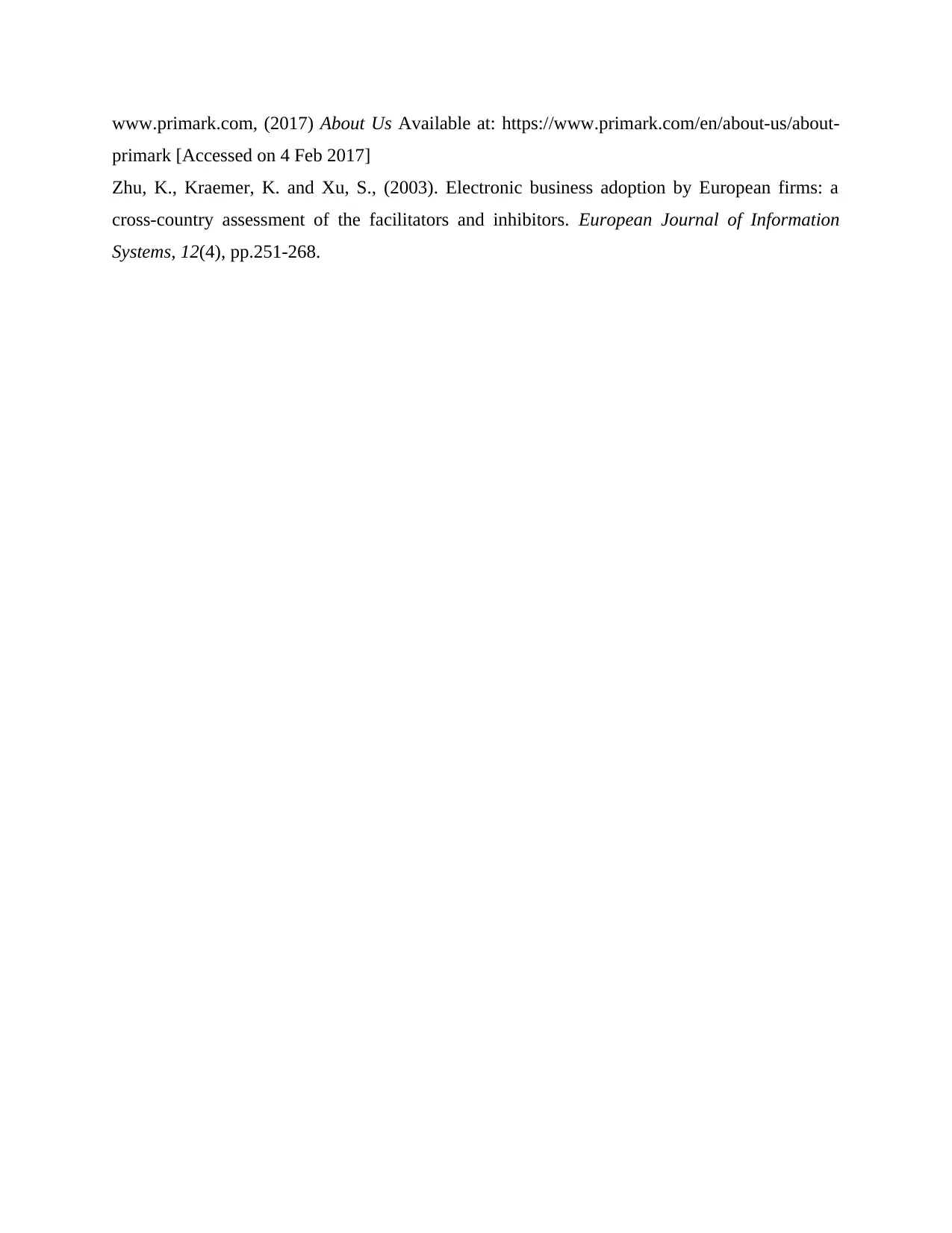
www.primark.com, (2017) About Us Available at: https://www.primark.com/en/about-us/about-
primark [Accessed on 4 Feb 2017]
Zhu, K., Kraemer, K. and Xu, S., (2003). Electronic business adoption by European firms: a
cross-country assessment of the facilitators and inhibitors. European Journal of Information
Systems, 12(4), pp.251-268.
primark [Accessed on 4 Feb 2017]
Zhu, K., Kraemer, K. and Xu, S., (2003). Electronic business adoption by European firms: a
cross-country assessment of the facilitators and inhibitors. European Journal of Information
Systems, 12(4), pp.251-268.
⊘ This is a preview!⊘
Do you want full access?
Subscribe today to unlock all pages.

Trusted by 1+ million students worldwide
1 out of 12
Related Documents
Your All-in-One AI-Powered Toolkit for Academic Success.
+13062052269
info@desklib.com
Available 24*7 on WhatsApp / Email
![[object Object]](/_next/static/media/star-bottom.7253800d.svg)
Unlock your academic potential
Copyright © 2020–2026 A2Z Services. All Rights Reserved. Developed and managed by ZUCOL.





